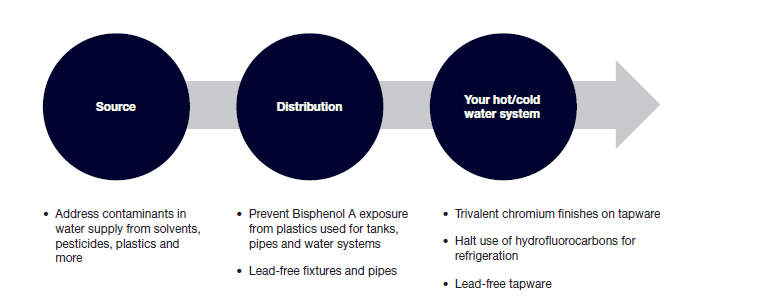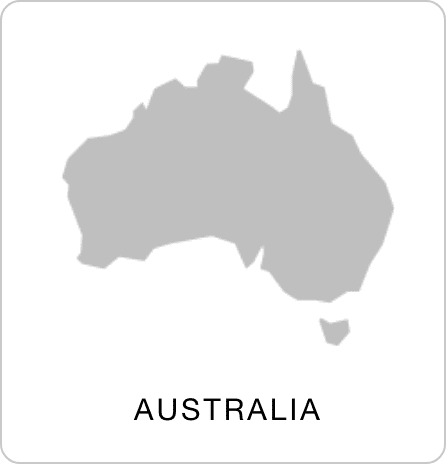Newest
Popular
Products
Can’t find what you are looking for, please call 1800 812 321 or email us on info@billi.com.au
Billi Media
A Roadmap to Healthier Materials
Trends in the Design and Manufacturing of Drinking Water Systems
A growing body of research on environmental health has demonstrated that chemicals known or suspected to be harmful to human health are frequently found in commercially available products, including building materials. These chemicals can leak out of such products, making their way into the air or drinking water and eventually into our bodies.
In response, whether they have been forced to do so due to legislation or in an effort to be more proactive in response to emerging health trends, manufacturers are exploring changes in the materials they use to create their products. Product transparency is becoming more common as manufacturers seek to gain trust by disclosing product ingredients and health impacts.
There are a number of chemical avoidance lists that have been created that list chemicals that should be avoided in building products. In relation to drinking water systems, the health effects
of chromium, lead, and bisphenol A (BPA) are now better understood, resulting in industry- and government-led initiatives to eliminate their use. Some substances, such as hydrofluorocarbons
(HFCs), which have been used as refrigerants, are also being phased out due to their global warming potential.
This paper examines these material trends and how they impact the design of drinking water systems. Designers are becoming more informed, demanding healthier building products, and taking the initiative to educate themselves about product certifications, including WELL, Red List and Watermark. As a result of collaboration across the industry, including with manufacturers, there are more and more products on the market that do not contain harmful chemicals.

Revisiting the “forever chemicals
A recent study revealed widespread contamination of surface and groundwater with “forever chemicals” (PFAS) globally, including Australia. These harmful chemicals are found in various products, such as firefighting foams, food packaging, carpets, and clothing. PFAS are persistent pollutants that do not break down in the environment and have been linked to serious health risks.
To address this growing concern, the Australian government is taking steps to restrict PFAS use and implement stricter regulations, with perfluorooctane sulfonic acid (PFOS) and perfluorooctanoic acid (PFOA) being among the most widely studied. This whitepaper highlights the importance of understanding the dangers of PFAS and the need for proactive measures to protect our water sources and safeguard public health.
How Billi is shaping material health outcomes
For almost three decades, Billi has led the global market with innovative tapware and instant boiling and chilled water filtration systems. Proudly Australian-made and designed, Billi products are
celebrated for their combination of functionality, performance and contemporary aesthetics.
Driven by a strong research and development team and a commitment to improving user health and quality of life, Billi supplies a range of instant boiling and chilled water dispensers that meet strict material health requirements that are continuously developing at a national and international level.
Whether it is chromium finishing, lead-free and BPA-free product design, or the use of sustainable refrigerants, Billi is always supporting current trends for sustainability and wellness, addressing the hydration needs of their users in a safe, efficient and environmentally friendly manner.
In today’s market, transparency in sustainability is a necessity for businesses across industries. Billi addresses this with independently verified and registered Environmental Product Declarations (EPD) under EN 15804.
In addition, Billi products have achieved Global Greentag certification and LCARate Gold Program recognition, providing assurance of the sustainability and fitness of their products throughout their lifecycle. Billi’s repair vs. replace ethos plus the introduction of R290 Green Gas allow Billi to be assessed under the newest version of the standard.
All Billi products are fully compliant with Watermark as well as the relevant Australian Standards and deliver extended ease of use, efficiency and a sleek contemporary aesthetic regardless of their
installation context.
Download the Architecture & Design whitepaper for the full article.
CATEGORIES
ARCHIVES
- March 2025
- February 2025
- January 2025
- December 2024
- November 2024
- October 2024
- September 2024
- August 2024
- July 2024
- June 2024
- May 2024
- April 2024
- March 2024
- February 2024
- November 2023
- September 2023
- June 2023
- April 2023
- March 2023
- January 2023
- December 2022
- November 2022
- October 2022
- July 2022
- June 2022
- April 2022
- March 2022
- January 2022
- December 2021
- November 2021
- October 2021
- September 2021
- August 2021
- July 2021
- June 2021
- November 2020
- June 2020
- February 2020
- January 2020
- November 2019
- October 2019
- September 2019
- July 2019
- April 2019
- March 2019
- February 2019
- November 2018
- May 2018
- February 2018
- October 2017
- May 2017
- January 2017
- October 2016
- September 2016
- April 2015
- March 2015
- November 2014
- October 2014



